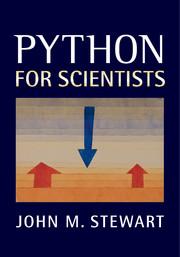Book contents
- Frontmatter
- Contents
- Preface
- 1 Introduction
- 2 Getting started with IPython
- 3 A short Python tutorial
- 4 Numpy
- 5 Two-dimensional graphics
- 6 Three-dimensional graphics
- 7 Ordinary differential equations
- 8 Partial differential equations: a pseudospectral approach
- 9 Case study: multigrid
- Appendix A Installing a Python environment
- Appendix B Fortran77 subroutines for pseudospectral methods
- References
- Index
1 - Introduction
Published online by Cambridge University Press: 05 August 2014
- Frontmatter
- Contents
- Preface
- 1 Introduction
- 2 Getting started with IPython
- 3 A short Python tutorial
- 4 Numpy
- 5 Two-dimensional graphics
- 6 Three-dimensional graphics
- 7 Ordinary differential equations
- 8 Partial differential equations: a pseudospectral approach
- 9 Case study: multigrid
- Appendix A Installing a Python environment
- Appendix B Fortran77 subroutines for pseudospectral methods
- References
- Index
Summary
The title of this book is “Python for Scientists”, but what does that mean? The dictionary defines “Python” as either (a) a non-venomous snake from Asia or Saharan Africa or (b) a computer scripting language, and it is the second option which is intended here. (What exactly this second definition means will be explained later.) By “scientist”, I mean anyone who uses quantitative models either to obtain conclusions by processing pre-collected experimental data or to model potentially observable results from a more abstract theory, and who asks “what if?”. What if I analyze the data in a different way? What if I change the model? Thus the term also includes economists, engineers, mathematicians among others, as well as the usual concept of scientists. Given the volume of potential data or the complexity (non-linearity) of many theoretical models, the use of computers to answer these questions is fast becoming mandatory.
Advances in computer hardware mean that immense amounts of data or evermore complex models can be processed at increasingly rapid speeds. These advances also mean reduced costs so that today virtually every scientist has access to a “personal computer”, either a desktop work station or a laptop, and the distinction between these two is narrowing quickly. It might seem to be a given that suitable software will also be available so that the “what if” questions can be answered readily. However, this turns out not always to be the case.
- Type
- Chapter
- Information
- Python for Scientists , pp. 1 - 10Publisher: Cambridge University PressPrint publication year: 2014
- 1
- Cited by



